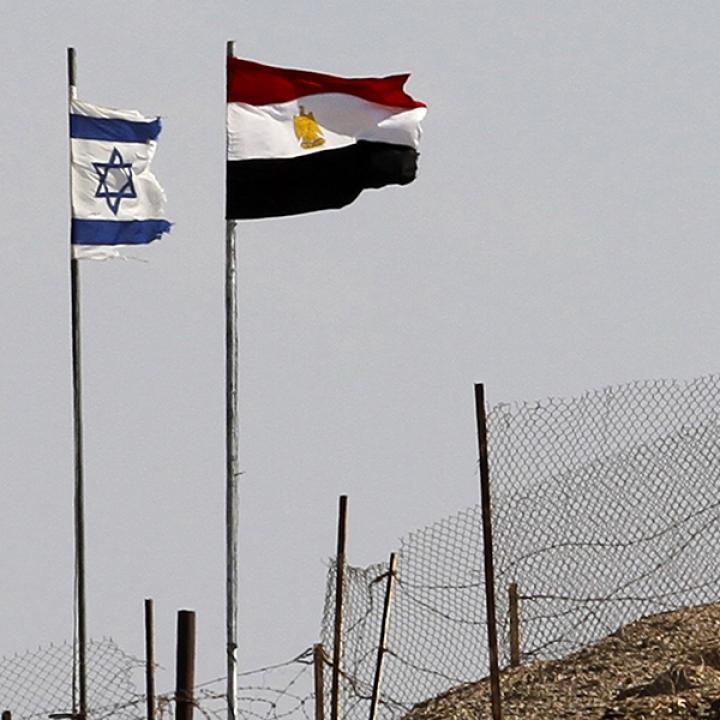

In this era, a political observer will not have to look towards the statements coming out of Tel Aviv to learn the nature of Israeli-Egyptian cooperation.
December 20, 2016
Since the first day of his inauguration, Abdel Fattah el-Sisi has talked constantly his support for the option of establishing a Palestinian state with its capital in East Jerusalem. A few months ago, in the Egyptian city of Assiut, Sisi announced his initiative to solve the Arab-Israeli conflict. This initiative was received very warmly in Israel and was followed by a historic visit from the Egyptian Foreign Minister, Sameh Shoukry, to the Israeli government headquarters in Jerusalem, where he met with Israeli Prime Minister Benjamin Netanyahu — an important step toward open and strong relations between Egypt and Israel in full view of the Egyptian and Arab public.
Setting another precedent in the bilateral relations between the two countries, Cairo decided to send Foreign Minister Sameh Shoukry to Jerusalem to attend the funeral of the former Israeli President Shimon Peres. The visit of such a high-level Egyptian figure — the foreign minister — and his meeting with Prime Minister Benjamin Netanyahu in the heart of Jerusalem is a tacit concession regarding the rights of Palestinians in Jerusalem and, in effect, an acknowledgment of an Israeli Jerusalem.
On the Israeli side, the Jewish state expected Sisi to be similar to former President Sadat, in that he would be able and willing to take serious steps toward resolving the Arab-Israeli conflict. However, it can be said that Sadat was more easily able to create his own regional agenda. Thanks to the legitimacy provided by the October War, Sadat was able to normalize relations with Israel separately from other Arab countries– a process which culminated with his visit to Jerusalem. Meanwhile, the one visit by his successor, Hosni Mubarak , was to attend the funeral of Israeli Prime Minister Yitzhak Rabin.
Egypt’s ambassador in Tel Aviv, Hazem Khairat, is another example of the new state of Egyptian-Israel relations. Khairat received Israeli Prime Minister Benjamin Netanyahu and Israeli President Reuven Rivlin during a celebration at the Egyptian embassy in Tel Aviv of the 64th anniversary of the July 23 Revolution. He is the first Egyptian ambassador to visit Israel since former President Mohamed Morsi recalled Ambassador Atef Salem in 2012 during Egypt’s protest and opposition to the Israel military operation in Gaza (Operation Pillar of Cloud). The participation of Israeli political leadership in such a celebration at the Egyptian embassy reflects reconciliation with the Egyptian-Israel conflict’s past, and movement toward a public political alliance between both countries.
Ambassador Khairat also made his mark on these bilateral relations with his significant appearance before the Jerusalem Post’s annual Diplomatic Conference, where he explained Egypt’s approach toward Israel and the peace process, saying that the Israeli-Palestinian conflict was the primary reason why the peace between Egypt and Israel was unpopular. He said it was possible to overcome the chilliness between the two peoples by reaching a two-state solution through the establishment of a Palestinian state, thereby ending the Israeli-Palestinian conflict.
Egyptian-Israeli relations took another positive turn when Israel accepted an offer of two Egyptian helicopters to help with the efforts to put out fires that swept Haifa recently. This incident was a breakaway from regular Egyptian-Israeli cooperation, which, previously, was centered on counter-terrorism and military cooperation in Sinai and the Gaza Strip. Many supporters of Sisi promoted the efforts to help Israel, demonstrating Egypt’s sincerity in both dealing with Israel, and in expanding its role as an actor in any anticipated peace process between Palestinians and Israelis.
Egyptian-Israeli relations have remained outside the scope of publicity over the four decades which have followed the Camp David Accords. However, since the ascension of Sisi to the presidency, there has been a clear tendency to call for revitalized relations with Israel. In sum, Sisi's statements about peace and the establishment of a Palestinian state with its capital in East Jerusalem — a concession from the traditional Egyptian diplomatic norms, which did not acknowledge the division of Jerusalem - demonstrate the Egyptian administration’s new approach towards Israel.
Foreign Minister Shoukry’s visit to Jerusalem and his meeting with Prime Minister Netanyahu inside the Israeli government headquarters shifted Egyptian discourse from rhetorical concessions about a united Palestinian Jerusalem to a tacit acknowledgment of the current situation. This is especially true in light of the pro-regime Egyptian media’s coverage of this visit, as well as its coverage of the visit by Netanyahu and Rivlin to the Egyptian embassy in Tel Aviv during the July 23 anniversary celebration.
These official, public activities, which have revived bilateral relations between the two countries — coupled with the highly-interested coverage by Egyptian official media — are strong indicators that Egypt is moving toward establishing a new era in its relations with Israel: an era based on a valuation of these relations with openly-defined features. In this era, a political observer will not have to look towards the statements coming out of Tel Aviv to learn the nature of Israeli-Egyptian cooperation.


